NRSG370: ICU Nursing - Safety, Legal Obligations, Patient Rights
VerifiedAdded on 2023/06/03
|8
|1918
|412
Report
AI Summary
This assignment critically analyzes safety issues and legal responsibilities for nurses in the Intensive Care Unit (ICU), focusing on the impact of long working hours and shift work on nurses' well-being and patient safety. It discusses the psychological and physiological effects of shift work, including fatigue, depression, and increased risk of injuries. The assignment also examines the ethical dilemmas surrounding patient confidentiality and the rights of carers, highlighting the importance of respecting patient autonomy while providing necessary information to family members. Furthermore, it addresses the challenges nurses face in balancing ethical obligations with legal requirements, particularly in situations involving end-of-life decisions and resource allocation. The paper references relevant literature and legal frameworks, such as HIPAA, to support its analysis of these complex issues in ICU nursing.
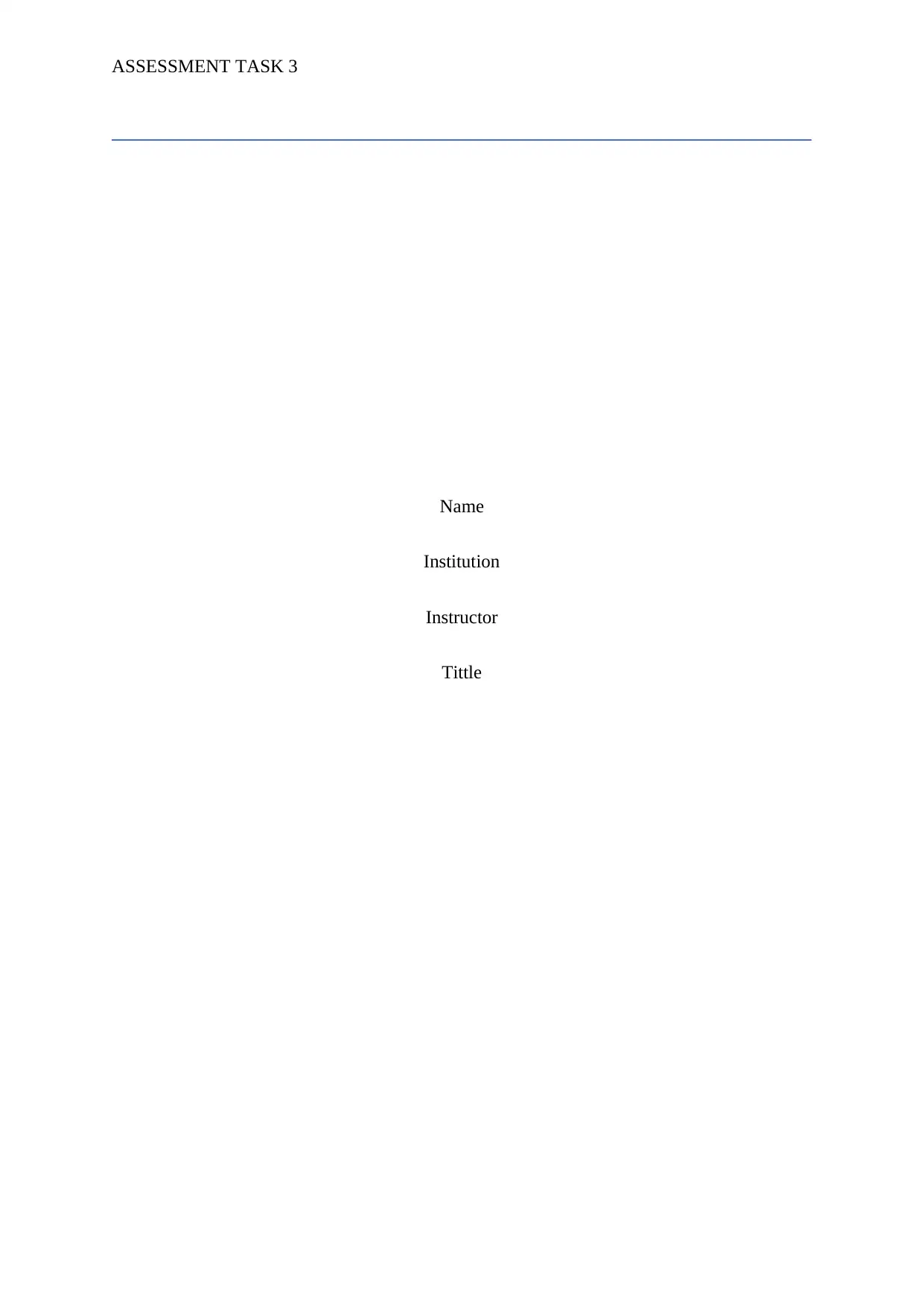
ASSESSMENT TASK 3
Name
Institution
Instructor
Tittle
Name
Institution
Instructor
Tittle
Paraphrase This Document
Need a fresh take? Get an instant paraphrase of this document with our AI Paraphraser
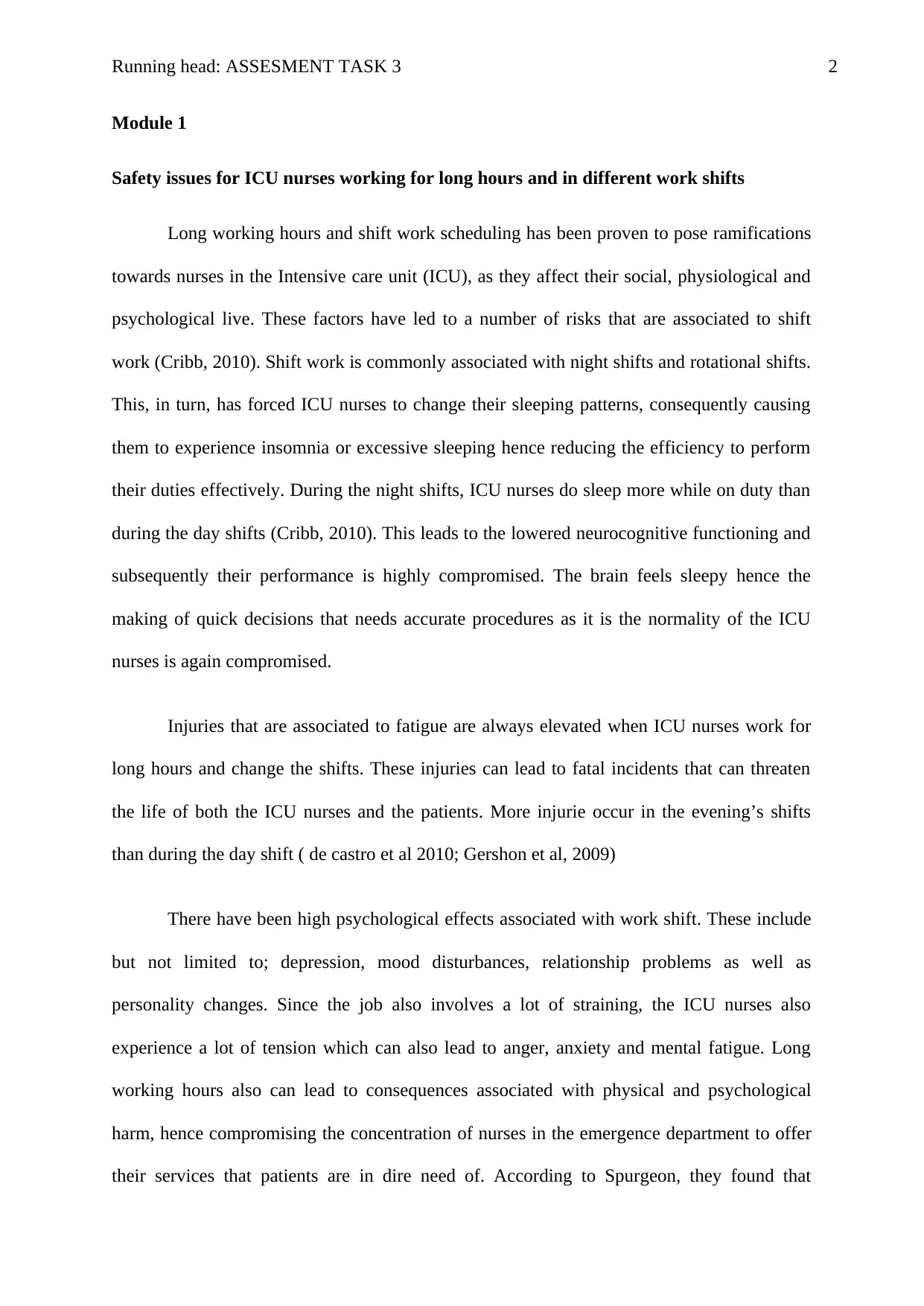
Running head: ASSESMENT TASK 3 2
Module 1
Safety issues for ICU nurses working for long hours and in different work shifts
Long working hours and shift work scheduling has been proven to pose ramifications
towards nurses in the Intensive care unit (ICU), as they affect their social, physiological and
psychological live. These factors have led to a number of risks that are associated to shift
work (Cribb, 2010). Shift work is commonly associated with night shifts and rotational shifts.
This, in turn, has forced ICU nurses to change their sleeping patterns, consequently causing
them to experience insomnia or excessive sleeping hence reducing the efficiency to perform
their duties effectively. During the night shifts, ICU nurses do sleep more while on duty than
during the day shifts (Cribb, 2010). This leads to the lowered neurocognitive functioning and
subsequently their performance is highly compromised. The brain feels sleepy hence the
making of quick decisions that needs accurate procedures as it is the normality of the ICU
nurses is again compromised.
Injuries that are associated to fatigue are always elevated when ICU nurses work for
long hours and change the shifts. These injuries can lead to fatal incidents that can threaten
the life of both the ICU nurses and the patients. More injurie occur in the evening’s shifts
than during the day shift ( de castro et al 2010; Gershon et al, 2009)
There have been high psychological effects associated with work shift. These include
but not limited to; depression, mood disturbances, relationship problems as well as
personality changes. Since the job also involves a lot of straining, the ICU nurses also
experience a lot of tension which can also lead to anger, anxiety and mental fatigue. Long
working hours also can lead to consequences associated with physical and psychological
harm, hence compromising the concentration of nurses in the emergence department to offer
their services that patients are in dire need of. According to Spurgeon, they found that
Module 1
Safety issues for ICU nurses working for long hours and in different work shifts
Long working hours and shift work scheduling has been proven to pose ramifications
towards nurses in the Intensive care unit (ICU), as they affect their social, physiological and
psychological live. These factors have led to a number of risks that are associated to shift
work (Cribb, 2010). Shift work is commonly associated with night shifts and rotational shifts.
This, in turn, has forced ICU nurses to change their sleeping patterns, consequently causing
them to experience insomnia or excessive sleeping hence reducing the efficiency to perform
their duties effectively. During the night shifts, ICU nurses do sleep more while on duty than
during the day shifts (Cribb, 2010). This leads to the lowered neurocognitive functioning and
subsequently their performance is highly compromised. The brain feels sleepy hence the
making of quick decisions that needs accurate procedures as it is the normality of the ICU
nurses is again compromised.
Injuries that are associated to fatigue are always elevated when ICU nurses work for
long hours and change the shifts. These injuries can lead to fatal incidents that can threaten
the life of both the ICU nurses and the patients. More injurie occur in the evening’s shifts
than during the day shift ( de castro et al 2010; Gershon et al, 2009)
There have been high psychological effects associated with work shift. These include
but not limited to; depression, mood disturbances, relationship problems as well as
personality changes. Since the job also involves a lot of straining, the ICU nurses also
experience a lot of tension which can also lead to anger, anxiety and mental fatigue. Long
working hours also can lead to consequences associated with physical and psychological
harm, hence compromising the concentration of nurses in the emergence department to offer
their services that patients are in dire need of. According to Spurgeon, they found that
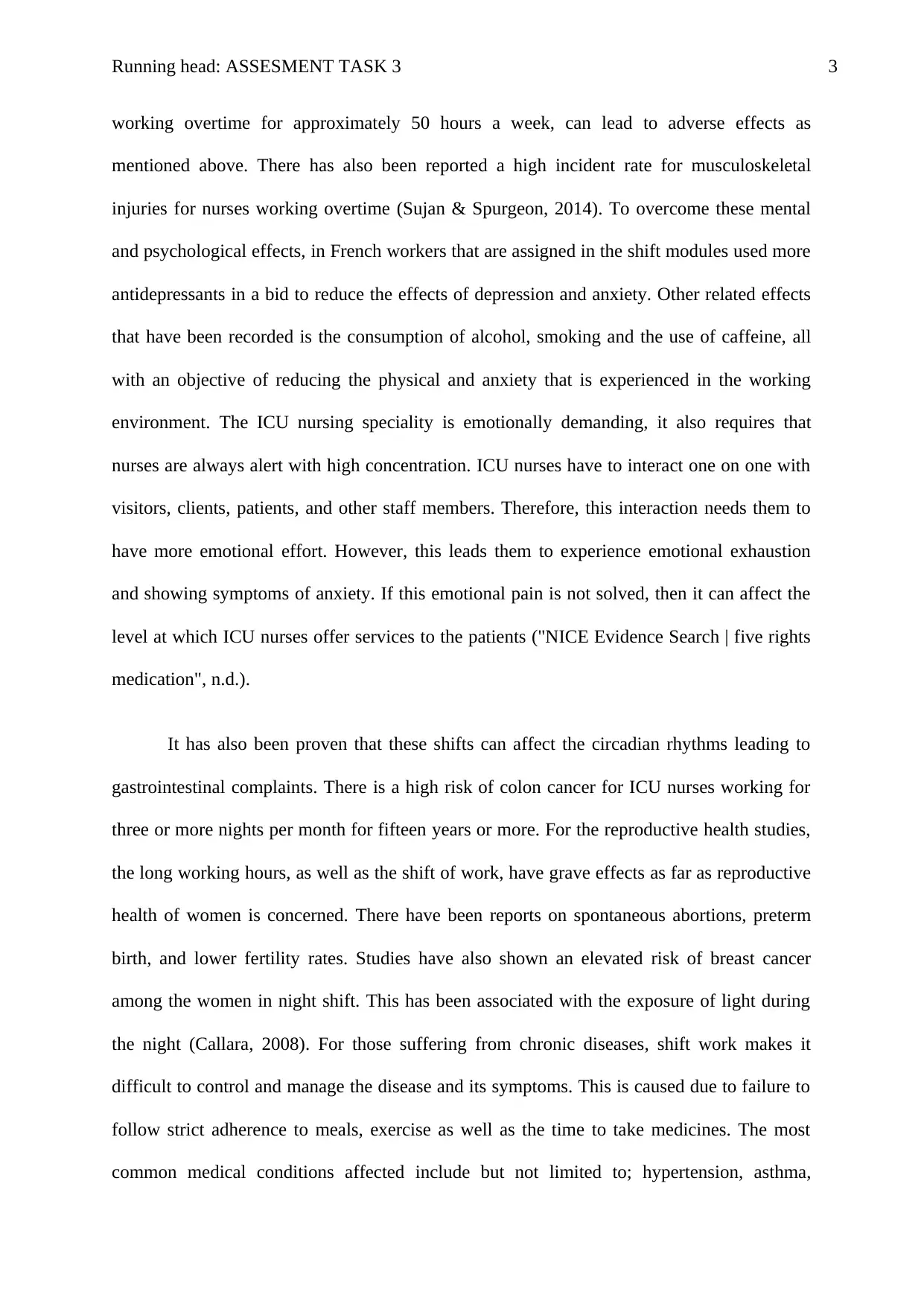
Running head: ASSESMENT TASK 3 3
working overtime for approximately 50 hours a week, can lead to adverse effects as
mentioned above. There has also been reported a high incident rate for musculoskeletal
injuries for nurses working overtime (Sujan & Spurgeon, 2014). To overcome these mental
and psychological effects, in French workers that are assigned in the shift modules used more
antidepressants in a bid to reduce the effects of depression and anxiety. Other related effects
that have been recorded is the consumption of alcohol, smoking and the use of caffeine, all
with an objective of reducing the physical and anxiety that is experienced in the working
environment. The ICU nursing speciality is emotionally demanding, it also requires that
nurses are always alert with high concentration. ICU nurses have to interact one on one with
visitors, clients, patients, and other staff members. Therefore, this interaction needs them to
have more emotional effort. However, this leads them to experience emotional exhaustion
and showing symptoms of anxiety. If this emotional pain is not solved, then it can affect the
level at which ICU nurses offer services to the patients ("NICE Evidence Search | five rights
medication", n.d.).
It has also been proven that these shifts can affect the circadian rhythms leading to
gastrointestinal complaints. There is a high risk of colon cancer for ICU nurses working for
three or more nights per month for fifteen years or more. For the reproductive health studies,
the long working hours, as well as the shift of work, have grave effects as far as reproductive
health of women is concerned. There have been reports on spontaneous abortions, preterm
birth, and lower fertility rates. Studies have also shown an elevated risk of breast cancer
among the women in night shift. This has been associated with the exposure of light during
the night (Callara, 2008). For those suffering from chronic diseases, shift work makes it
difficult to control and manage the disease and its symptoms. This is caused due to failure to
follow strict adherence to meals, exercise as well as the time to take medicines. The most
common medical conditions affected include but not limited to; hypertension, asthma,
working overtime for approximately 50 hours a week, can lead to adverse effects as
mentioned above. There has also been reported a high incident rate for musculoskeletal
injuries for nurses working overtime (Sujan & Spurgeon, 2014). To overcome these mental
and psychological effects, in French workers that are assigned in the shift modules used more
antidepressants in a bid to reduce the effects of depression and anxiety. Other related effects
that have been recorded is the consumption of alcohol, smoking and the use of caffeine, all
with an objective of reducing the physical and anxiety that is experienced in the working
environment. The ICU nursing speciality is emotionally demanding, it also requires that
nurses are always alert with high concentration. ICU nurses have to interact one on one with
visitors, clients, patients, and other staff members. Therefore, this interaction needs them to
have more emotional effort. However, this leads them to experience emotional exhaustion
and showing symptoms of anxiety. If this emotional pain is not solved, then it can affect the
level at which ICU nurses offer services to the patients ("NICE Evidence Search | five rights
medication", n.d.).
It has also been proven that these shifts can affect the circadian rhythms leading to
gastrointestinal complaints. There is a high risk of colon cancer for ICU nurses working for
three or more nights per month for fifteen years or more. For the reproductive health studies,
the long working hours, as well as the shift of work, have grave effects as far as reproductive
health of women is concerned. There have been reports on spontaneous abortions, preterm
birth, and lower fertility rates. Studies have also shown an elevated risk of breast cancer
among the women in night shift. This has been associated with the exposure of light during
the night (Callara, 2008). For those suffering from chronic diseases, shift work makes it
difficult to control and manage the disease and its symptoms. This is caused due to failure to
follow strict adherence to meals, exercise as well as the time to take medicines. The most
common medical conditions affected include but not limited to; hypertension, asthma,
⊘ This is a preview!⊘
Do you want full access?
Subscribe today to unlock all pages.

Trusted by 1+ million students worldwide
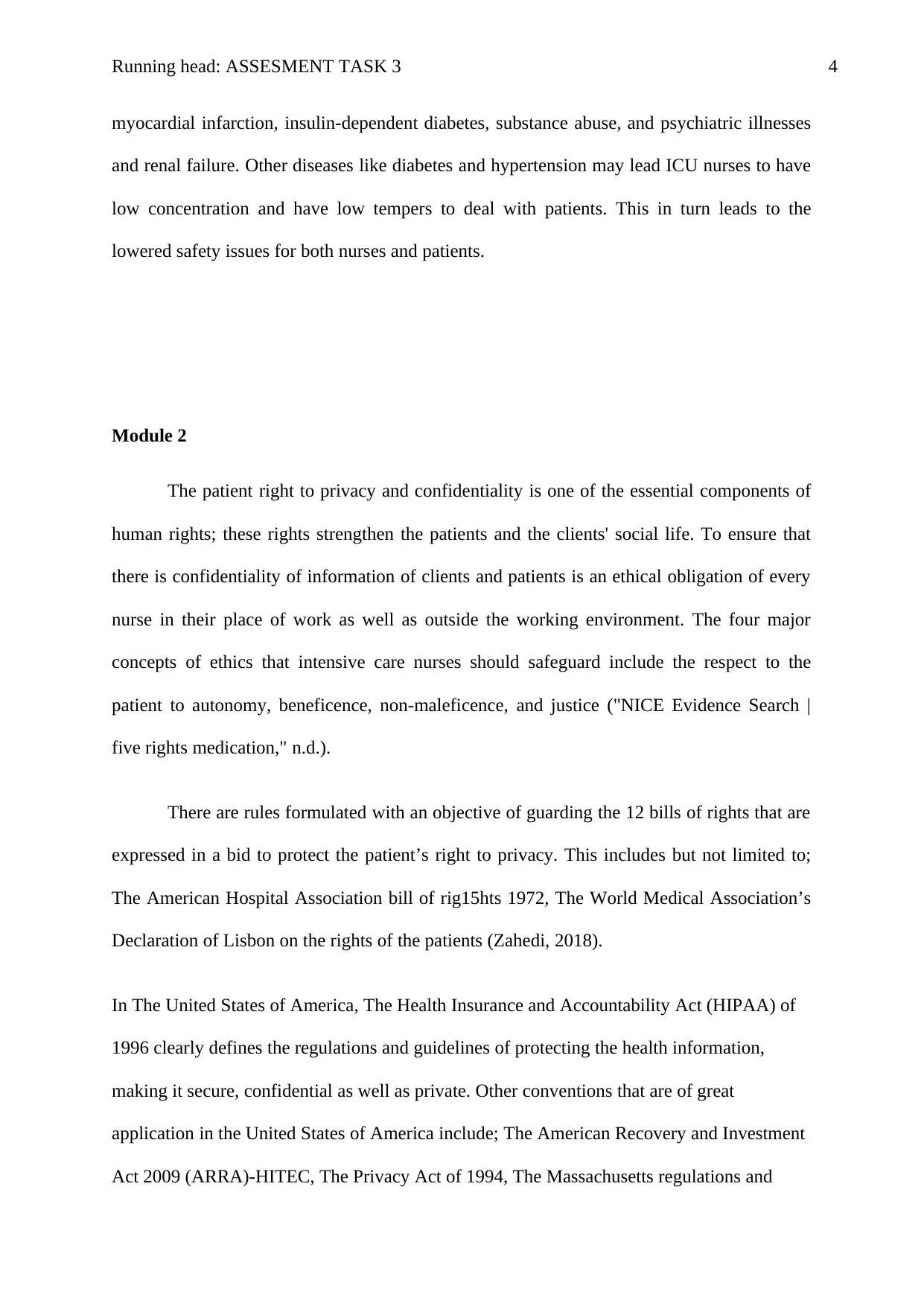
Running head: ASSESMENT TASK 3 4
myocardial infarction, insulin-dependent diabetes, substance abuse, and psychiatric illnesses
and renal failure. Other diseases like diabetes and hypertension may lead ICU nurses to have
low concentration and have low tempers to deal with patients. This in turn leads to the
lowered safety issues for both nurses and patients.
Module 2
The patient right to privacy and confidentiality is one of the essential components of
human rights; these rights strengthen the patients and the clients' social life. To ensure that
there is confidentiality of information of clients and patients is an ethical obligation of every
nurse in their place of work as well as outside the working environment. The four major
concepts of ethics that intensive care nurses should safeguard include the respect to the
patient to autonomy, beneficence, non-maleficence, and justice ("NICE Evidence Search |
five rights medication," n.d.).
There are rules formulated with an objective of guarding the 12 bills of rights that are
expressed in a bid to protect the patient’s right to privacy. This includes but not limited to;
The American Hospital Association bill of rig15hts 1972, The World Medical Association’s
Declaration of Lisbon on the rights of the patients (Zahedi, 2018).
In The United States of America, The Health Insurance and Accountability Act (HIPAA) of
1996 clearly defines the regulations and guidelines of protecting the health information,
making it secure, confidential as well as private. Other conventions that are of great
application in the United States of America include; The American Recovery and Investment
Act 2009 (ARRA)-HITEC, The Privacy Act of 1994, The Massachusetts regulations and
myocardial infarction, insulin-dependent diabetes, substance abuse, and psychiatric illnesses
and renal failure. Other diseases like diabetes and hypertension may lead ICU nurses to have
low concentration and have low tempers to deal with patients. This in turn leads to the
lowered safety issues for both nurses and patients.
Module 2
The patient right to privacy and confidentiality is one of the essential components of
human rights; these rights strengthen the patients and the clients' social life. To ensure that
there is confidentiality of information of clients and patients is an ethical obligation of every
nurse in their place of work as well as outside the working environment. The four major
concepts of ethics that intensive care nurses should safeguard include the respect to the
patient to autonomy, beneficence, non-maleficence, and justice ("NICE Evidence Search |
five rights medication," n.d.).
There are rules formulated with an objective of guarding the 12 bills of rights that are
expressed in a bid to protect the patient’s right to privacy. This includes but not limited to;
The American Hospital Association bill of rig15hts 1972, The World Medical Association’s
Declaration of Lisbon on the rights of the patients (Zahedi, 2018).
In The United States of America, The Health Insurance and Accountability Act (HIPAA) of
1996 clearly defines the regulations and guidelines of protecting the health information,
making it secure, confidential as well as private. Other conventions that are of great
application in the United States of America include; The American Recovery and Investment
Act 2009 (ARRA)-HITEC, The Privacy Act of 1994, The Massachusetts regulations and
Paraphrase This Document
Need a fresh take? Get an instant paraphrase of this document with our AI Paraphraser
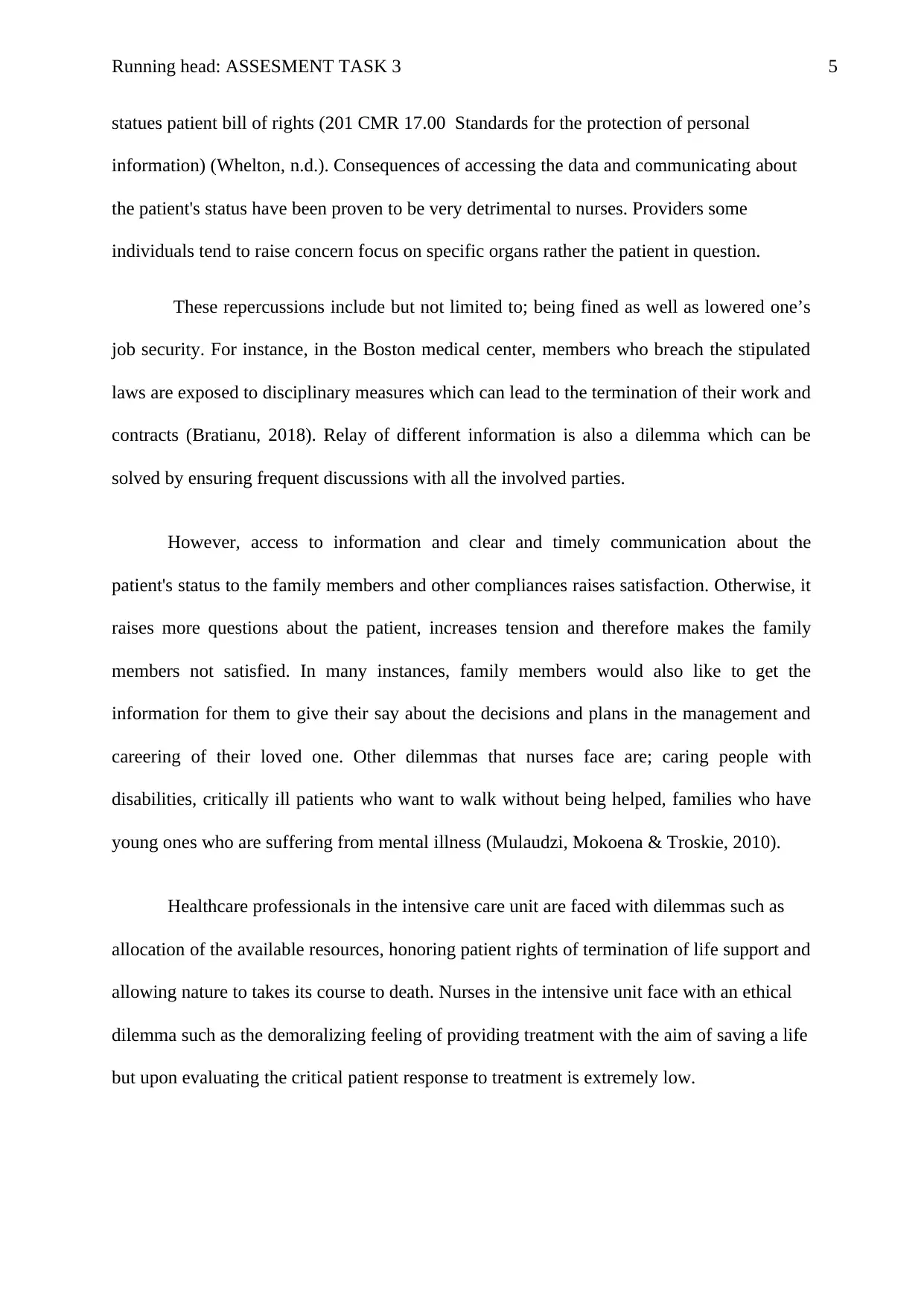
Running head: ASSESMENT TASK 3 5
statues patient bill of rights (201 CMR 17.00 Standards for the protection of personal
information) (Whelton, n.d.). Consequences of accessing the data and communicating about
the patient's status have been proven to be very detrimental to nurses. Providers some
individuals tend to raise concern focus on specific organs rather the patient in question.
These repercussions include but not limited to; being fined as well as lowered one’s
job security. For instance, in the Boston medical center, members who breach the stipulated
laws are exposed to disciplinary measures which can lead to the termination of their work and
contracts (Bratianu, 2018). Relay of different information is also a dilemma which can be
solved by ensuring frequent discussions with all the involved parties.
However, access to information and clear and timely communication about the
patient's status to the family members and other compliances raises satisfaction. Otherwise, it
raises more questions about the patient, increases tension and therefore makes the family
members not satisfied. In many instances, family members would also like to get the
information for them to give their say about the decisions and plans in the management and
careering of their loved one. Other dilemmas that nurses face are; caring people with
disabilities, critically ill patients who want to walk without being helped, families who have
young ones who are suffering from mental illness (Mulaudzi, Mokoena & Troskie, 2010).
Healthcare professionals in the intensive care unit are faced with dilemmas such as
allocation of the available resources, honoring patient rights of termination of life support and
allowing nature to takes its course to death. Nurses in the intensive unit face with an ethical
dilemma such as the demoralizing feeling of providing treatment with the aim of saving a life
but upon evaluating the critical patient response to treatment is extremely low.
statues patient bill of rights (201 CMR 17.00 Standards for the protection of personal
information) (Whelton, n.d.). Consequences of accessing the data and communicating about
the patient's status have been proven to be very detrimental to nurses. Providers some
individuals tend to raise concern focus on specific organs rather the patient in question.
These repercussions include but not limited to; being fined as well as lowered one’s
job security. For instance, in the Boston medical center, members who breach the stipulated
laws are exposed to disciplinary measures which can lead to the termination of their work and
contracts (Bratianu, 2018). Relay of different information is also a dilemma which can be
solved by ensuring frequent discussions with all the involved parties.
However, access to information and clear and timely communication about the
patient's status to the family members and other compliances raises satisfaction. Otherwise, it
raises more questions about the patient, increases tension and therefore makes the family
members not satisfied. In many instances, family members would also like to get the
information for them to give their say about the decisions and plans in the management and
careering of their loved one. Other dilemmas that nurses face are; caring people with
disabilities, critically ill patients who want to walk without being helped, families who have
young ones who are suffering from mental illness (Mulaudzi, Mokoena & Troskie, 2010).
Healthcare professionals in the intensive care unit are faced with dilemmas such as
allocation of the available resources, honoring patient rights of termination of life support and
allowing nature to takes its course to death. Nurses in the intensive unit face with an ethical
dilemma such as the demoralizing feeling of providing treatment with the aim of saving a life
but upon evaluating the critical patient response to treatment is extremely low.
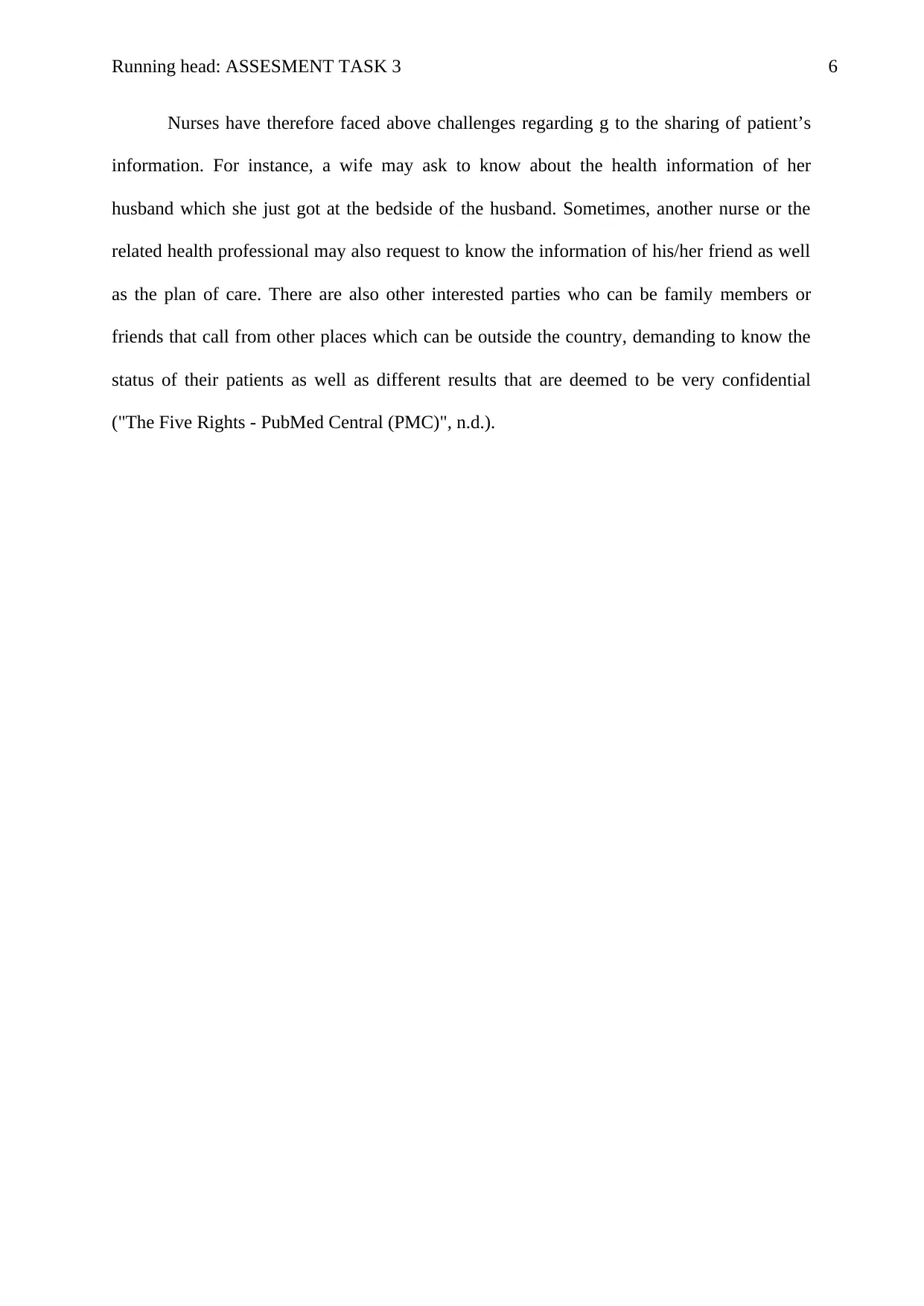
Running head: ASSESMENT TASK 3 6
Nurses have therefore faced above challenges regarding g to the sharing of patient’s
information. For instance, a wife may ask to know about the health information of her
husband which she just got at the bedside of the husband. Sometimes, another nurse or the
related health professional may also request to know the information of his/her friend as well
as the plan of care. There are also other interested parties who can be family members or
friends that call from other places which can be outside the country, demanding to know the
status of their patients as well as different results that are deemed to be very confidential
("The Five Rights - PubMed Central (PMC)", n.d.).
Nurses have therefore faced above challenges regarding g to the sharing of patient’s
information. For instance, a wife may ask to know about the health information of her
husband which she just got at the bedside of the husband. Sometimes, another nurse or the
related health professional may also request to know the information of his/her friend as well
as the plan of care. There are also other interested parties who can be family members or
friends that call from other places which can be outside the country, demanding to know the
status of their patients as well as different results that are deemed to be very confidential
("The Five Rights - PubMed Central (PMC)", n.d.).
⊘ This is a preview!⊘
Do you want full access?
Subscribe today to unlock all pages.

Trusted by 1+ million students worldwide
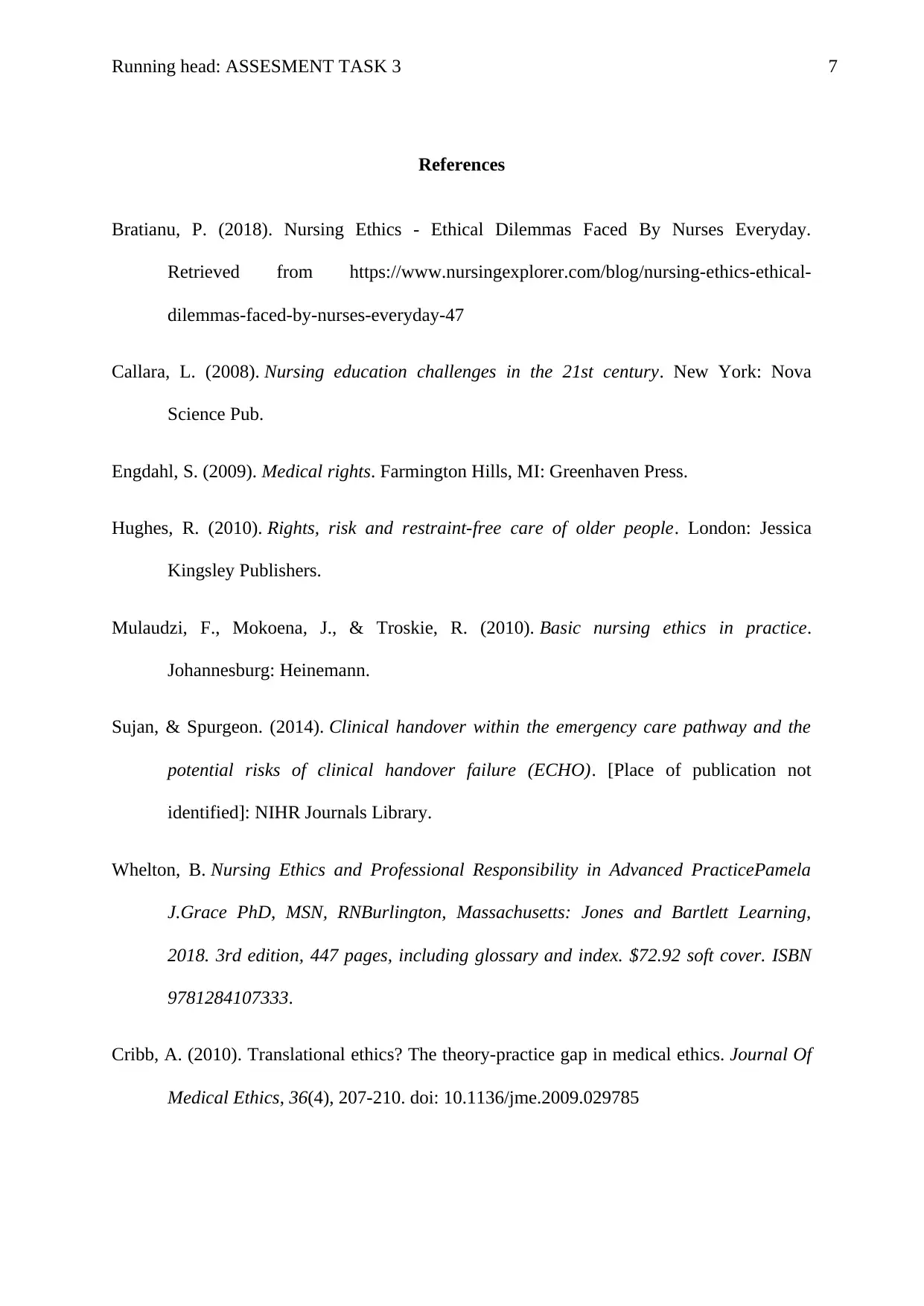
Running head: ASSESMENT TASK 3 7
References
Bratianu, P. (2018). Nursing Ethics - Ethical Dilemmas Faced By Nurses Everyday.
Retrieved from https://www.nursingexplorer.com/blog/nursing-ethics-ethical-
dilemmas-faced-by-nurses-everyday-47
Callara, L. (2008). Nursing education challenges in the 21st century. New York: Nova
Science Pub.
Engdahl, S. (2009). Medical rights. Farmington Hills, MI: Greenhaven Press.
Hughes, R. (2010). Rights, risk and restraint-free care of older people. London: Jessica
Kingsley Publishers.
Mulaudzi, F., Mokoena, J., & Troskie, R. (2010). Basic nursing ethics in practice.
Johannesburg: Heinemann.
Sujan, & Spurgeon. (2014). Clinical handover within the emergency care pathway and the
potential risks of clinical handover failure (ECHO). [Place of publication not
identified]: NIHR Journals Library.
Whelton, B. Nursing Ethics and Professional Responsibility in Advanced PracticePamela
J.Grace PhD, MSN, RNBurlington, Massachusetts: Jones and Bartlett Learning,
2018. 3rd edition, 447 pages, including glossary and index. $72.92 soft cover. ISBN
9781284107333.
Cribb, A. (2010). Translational ethics? The theory-practice gap in medical ethics. Journal Of
Medical Ethics, 36(4), 207-210. doi: 10.1136/jme.2009.029785
References
Bratianu, P. (2018). Nursing Ethics - Ethical Dilemmas Faced By Nurses Everyday.
Retrieved from https://www.nursingexplorer.com/blog/nursing-ethics-ethical-
dilemmas-faced-by-nurses-everyday-47
Callara, L. (2008). Nursing education challenges in the 21st century. New York: Nova
Science Pub.
Engdahl, S. (2009). Medical rights. Farmington Hills, MI: Greenhaven Press.
Hughes, R. (2010). Rights, risk and restraint-free care of older people. London: Jessica
Kingsley Publishers.
Mulaudzi, F., Mokoena, J., & Troskie, R. (2010). Basic nursing ethics in practice.
Johannesburg: Heinemann.
Sujan, & Spurgeon. (2014). Clinical handover within the emergency care pathway and the
potential risks of clinical handover failure (ECHO). [Place of publication not
identified]: NIHR Journals Library.
Whelton, B. Nursing Ethics and Professional Responsibility in Advanced PracticePamela
J.Grace PhD, MSN, RNBurlington, Massachusetts: Jones and Bartlett Learning,
2018. 3rd edition, 447 pages, including glossary and index. $72.92 soft cover. ISBN
9781284107333.
Cribb, A. (2010). Translational ethics? The theory-practice gap in medical ethics. Journal Of
Medical Ethics, 36(4), 207-210. doi: 10.1136/jme.2009.029785
Paraphrase This Document
Need a fresh take? Get an instant paraphrase of this document with our AI Paraphraser
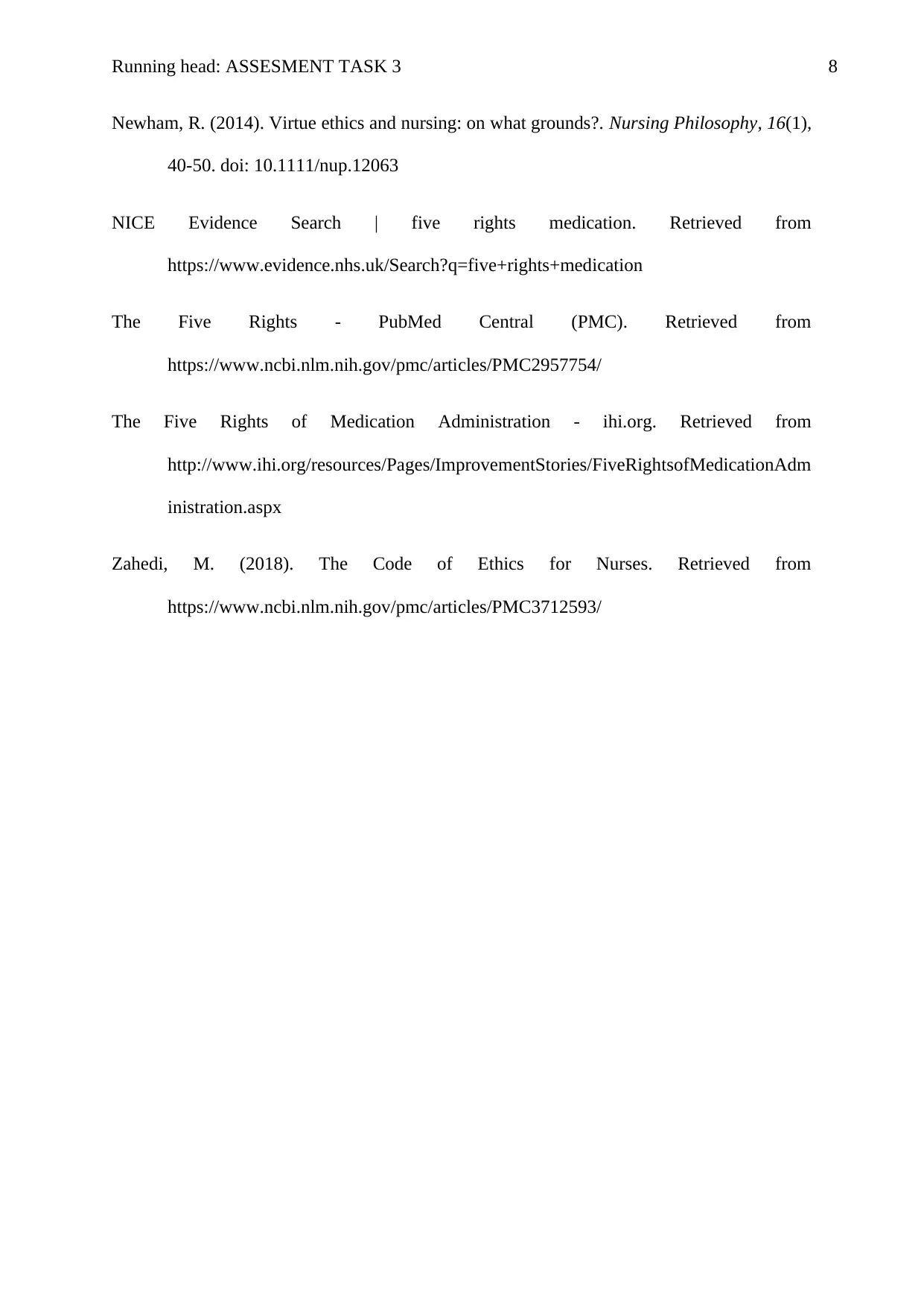
Running head: ASSESMENT TASK 3 8
Newham, R. (2014). Virtue ethics and nursing: on what grounds?. Nursing Philosophy, 16(1),
40-50. doi: 10.1111/nup.12063
NICE Evidence Search | five rights medication. Retrieved from
https://www.evidence.nhs.uk/Search?q=five+rights+medication
The Five Rights - PubMed Central (PMC). Retrieved from
https://www.ncbi.nlm.nih.gov/pmc/articles/PMC2957754/
The Five Rights of Medication Administration - ihi.org. Retrieved from
http://www.ihi.org/resources/Pages/ImprovementStories/FiveRightsofMedicationAdm
inistration.aspx
Zahedi, M. (2018). The Code of Ethics for Nurses. Retrieved from
https://www.ncbi.nlm.nih.gov/pmc/articles/PMC3712593/
Newham, R. (2014). Virtue ethics and nursing: on what grounds?. Nursing Philosophy, 16(1),
40-50. doi: 10.1111/nup.12063
NICE Evidence Search | five rights medication. Retrieved from
https://www.evidence.nhs.uk/Search?q=five+rights+medication
The Five Rights - PubMed Central (PMC). Retrieved from
https://www.ncbi.nlm.nih.gov/pmc/articles/PMC2957754/
The Five Rights of Medication Administration - ihi.org. Retrieved from
http://www.ihi.org/resources/Pages/ImprovementStories/FiveRightsofMedicationAdm
inistration.aspx
Zahedi, M. (2018). The Code of Ethics for Nurses. Retrieved from
https://www.ncbi.nlm.nih.gov/pmc/articles/PMC3712593/
1 out of 8
Related Documents
Your All-in-One AI-Powered Toolkit for Academic Success.
+13062052269
info@desklib.com
Available 24*7 on WhatsApp / Email
![[object Object]](/_next/static/media/star-bottom.7253800d.svg)
Unlock your academic potential
Copyright © 2020–2026 A2Z Services. All Rights Reserved. Developed and managed by ZUCOL.





